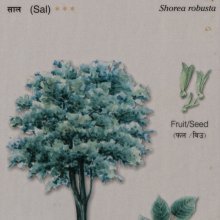Haga: 5 definitions
Introduction:
Haga means something in the history of ancient India, Marathi, biology. If you want to know the exact meaning, history, etymology or English translation of this term then check out the descriptions on this page. Add your comment or reference to a book if you want to contribute to this summary article.
Images (photo gallery)
India history and geography
Source: Cologne Digital Sanskrit Dictionaries: Indian Epigraphical GlossaryHāga.—(IE 8-8, EI 5), Kannaḍa; same as pāga, or Sanskrit bhāga; name of a coin. Note: hāga is defined in the “Indian epigraphical glossary” as it can be found on ancient inscriptions commonly written in Sanskrit, Prakrit or Dravidian languages.
--- OR ---
Hāga.—Kannaḍa; same as Sanskrit bhāga; probably (1/4) of the standard coin; see pāga. Note: hāga is defined in the “Indian epigraphical glossary” as it can be found on ancient inscriptions commonly written in Sanskrit, Prakrit or Dravidian languages.

The history of India traces the identification of countries, villages, towns and other regions of India, as well as mythology, zoology, royal dynasties, rulers, tribes, local festivities and traditions and regional languages. Ancient India enjoyed religious freedom and encourages the path of Dharma, a concept common to Buddhism, Hinduism, and Jainism.
Biology (plants and animals)
Source: Google Books: CRC World Dictionary (Regional names)Haga in India is the name of a plant defined with Abrus precatorius in various botanical sources. This page contains potential references in Ayurveda, modern medicine, and other folk traditions or local practices It has the synonym Abrus maculatus Noronha, nom. nud. (among others).
Example references for further research on medicinal uses or toxicity (see latin names for full list):
· Willdenowia (1986)
· Economic Botany (1990)
· Kew Bulletin (1970)
· Contributions from the United States National Herbarium (1905)
· Journal of Ethnopharmacology (1983)
· Botanica Macaronesica (1980)
If you are looking for specific details regarding Haga, for example health benefits, side effects, pregnancy safety, extract dosage, diet and recipes, chemical composition, have a look at these references.

This sections includes definitions from the five kingdoms of living things: Animals, Plants, Fungi, Protists and Monera. It will include both the official binomial nomenclature (scientific names usually in Latin) as well as regional spellings and variants.
Languages of India and abroad
Marathi-English dictionary
Source: DDSA: The Molesworth Marathi and English Dictionaryhaga (हग).—m (hada S root.) Ordure or excrement (of man and beasts in general).
--- OR ---
hāga (हाग).—See these and other compounds and derivatives of hāga under haga.
Source: DDSA: The Aryabhusan school dictionary, Marathi-Englishhaga (हग).—m Ordure or excrement (of man and beasts).
Marathi is an Indo-European language having over 70 million native speakers people in (predominantly) Maharashtra India. Marathi, like many other Indo-Aryan languages, evolved from early forms of Prakrit, which itself is a subset of Sanskrit, one of the most ancient languages of the world.
Kannada-English dictionary
Source: Alar: Kannada-English corpusHaga (ಹಗ):—[noun] a hole made in the ground for storing grains.
--- OR ---
Hāga (ಹಾಗ):—
1) [noun] any of the four equal parts of something; a fourth; a quarter.
2) [noun] (hist.) a monetary coin of very small denomination.
3) [noun] (hist.) a unit of weight.
4) [noun] a part or portion that belongs or is allotted to an individual or is one is eligible for.
--- OR ---
Hāga (ಹಾಗ):—[noun] the plant Abrus typica (var. albiflora) of Papilionaceae family; Indian liquorice plant.
Kannada is a Dravidian language (as opposed to the Indo-European language family) mainly spoken in the southwestern region of India.
See also (Relevant definitions)
Starts with (+47): Hagabalagi, Hagad, Hagada, Hagade, Hagaha, Hagai, Hagaibhanda-padhai-thulo, Hagal, Hagala, Hagalakay, Hagalemmutalem, Hagalereya, Hagaleru, Hagalimutali, Hagalodeya, Hagalu, Hagaludarode, Hagaludivati, Hagaludivatige, Hagalugalla.
Ends with (+584): Abhaga, Acchaga, Addhabhaga, Adhaga, Adhobhaga, Agnivibhaga, Agrabhaga, Ahitthaga, Ahutibhaga, Aikkhaga, Ajjhaga, Ajyabhaga, Akanishthaga, Akashaga, Akkhaga, Akshabhaga, Amitabhaga, Anamgasubhaga, Angabhaga, Anhaga.
Full-text: Hagaoka, Tetemtie-haga, Hagas, Hagapalu, Hagera, Arevaga, Paga, Hagasa, Hagandari, Barabara, Bhaga, Bele.
Relevant text
Search found 1 books and stories containing Haga, Hāga; (plurals include: Hagas, Hāgas). You can also click to the full overview containing English textual excerpts. Below are direct links for the most relevant articles:
Amaravati Art in the Context of Andhra Archaeology (by Sreyashi Ray chowdhuri)
Epigraphs from Amarāvatī (i) Monks and Nuns < [Chapter 4 - Survival of Amarāvatī in the Context of Andhra Art]
